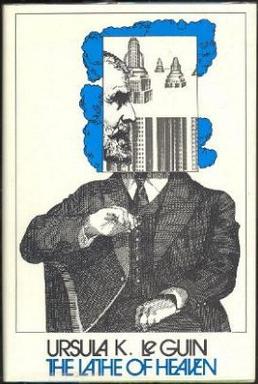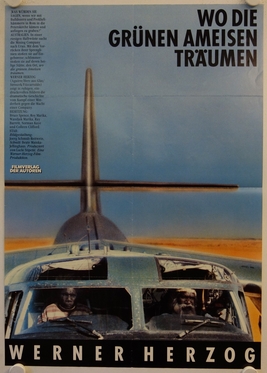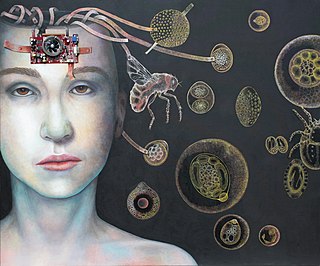Related Research Articles

Alien invasion or space invasion is a common feature in science fiction stories and film, in which extraterrestrial lifeforms invade the Earth to exterminate and supplant human life, enslave it, harvest people for food, steal the planet's resources, or destroy the planet altogether. It can be considered as a science-fiction subgenre of the invasion literature, expanded by H. G. Wells's seminal alien invasion novel The War of the Worlds.

Sexual themes are frequently used in science fiction or related genres. Such elements may include depictions of realistic sexual interactions in a science fictional setting, a protagonist with an alternative sexuality, a sexual encounter between a human and a fictional extraterrestrial, or exploration of the varieties of sexual experience that deviate from the conventional.
Science fiction is a film genre that uses speculative, fictional science-based depictions of phenomena that are not fully accepted by mainstream science, such as extraterrestrial lifeforms, spacecraft, robots, cyborgs, dinosaurs, mutants, interstellar travel, time travel, or other technologies. Science fiction films have often been used to focus on political or social issues, and to explore philosophical issues like the human condition.

In evolutionary ecology, a parasitoid is an organism that lives in close association with its host at the host's expense, eventually resulting in the death of the host. Parasitoidism is one of six major evolutionary strategies within parasitism, distinguished by the fatal prognosis for the host, which makes the strategy close to predation.
Speculative and science fiction writers have often addressed the social, political, technological, and biological consequences of pregnancy and reproduction through the exploration of possible futures or alternative realities.

The Lathe of Heaven is a 1971 science fiction novel by American writer Ursula K. Le Guin. The plot concerns a character whose dreams alter past and present reality. The story was serialized in the American science fiction magazine Amazing Stories. The novel received nominations for the 1972 Hugo and the 1971 Nebula Award, and won the Locus Award for Best Novel in 1972. Two television film adaptations were released: the PBS production, The Lathe of Heaven (1980), and Lathe of Heaven (2002), a remake produced by the A&E Network.

Where the Green Ants Dream is a 1984 English-language West German film co-written and directed by Werner Herzog, made in Australia. Based on a true story about Indigenous land rights in Australia but slated as a mixture of fact and fiction, the film only got a limited release in Australia and was not well received by critics, although it did fare a bit better in Europe and North America.
Several themes recur throughout the works of American science fiction and fantasy author C. J. Cherryh.

Rogue Queen is a science fiction novel by American writer L. Sprague de Camp, the third book in his Viagens Interplanetarias series. It was first published in hardcover by Doubleday in 1951, and in paperback by Dell Books in 1952. A later hardcover edition was issued by The Easton Press in its The Masterpieces of Science Fiction series in 1996; later paperback editions were issued by Ace Books (1965) and Signet Books. A trade paperback edition was issued by Bluejay Books in June 1985. The first British edition was published in paperback by Pinnacle Books in 1954; a British hardcover reprint followed from Remploy in 1974. The novel has been translated into Portuguese, Italian, French and German. An E-book edition was published by Gollancz's SF Gateway imprint on September 29, 2011 as part of a general release of de Camp's works in electronic form.

Bloodchild and Other Stories is the only collection of science fiction stories and essays written by American writer Octavia E. Butler. Each story and essay features an afterword by Butler. "Bloodchild", the title story, won the Hugo Award and Nebula Award.
Raymattja Marika, also known as Gunutjpitt Gunuwanga, was a Yolngu leader, scholar, educator, translator, linguist and cultural advocate for Aboriginal Australians. She was a Director of Reconciliation Australia and a member of the Australian Institute of Aboriginal and Torres Strait Islander Studies. She was also a director of the Yothu Yindi Foundation and a participant in the 2020 Summit, which was held in April 2008. Marika advocated understanding and reconciliation between Indigenous Australian and Western cultures.
Alien abduction entities are the beings alleged to secretly abduct and subject experiencers to a forced medical examination which often emphasizes their reproductive system. Mainstream scientists and mental health professionals overwhelmingly doubt that the phenomenon occurs literally as reported and instead attribute the experiences to "deception, suggestibility, personality, sleep phenomena, psychopathology, psychodynamics [and] environmental factors." Skeptic Robert Sheaffer also sees similarity between the aliens depicted in early science fiction films, in particular, Invaders From Mars, and those reported to have actually abducted people. The first alien abduction claim to be widely publicized was the Betty and Barney Hill abduction in 1961, which featured diminutive, large-eyed beings who wore military-style uniforms.
The anthropologist Leon E. Stover says of science fiction's relationship to anthropology: "Anthropological science fiction enjoys the philosophical luxury of providing answers to the question "What is man?" while anthropology the science is still learning how to frame it". The editors of a collection of anthropological SF stories observed:
Anthropology is the science of man. It tells the story from ape-man to spaceman, attempting to describe in detail all the epochs of this continuing history. Writers of fiction, and in particular science fiction, peer over the anthropologists' shoulders as the discoveries are made, then utilize the material in fictional works. Where the scientist must speculate reservedly from known fact and make a small leap into the unknown, the writer is free to soar high on the wings of fancy.

The War of the Worlds is a science fiction novel by English author H. G. Wells. It was written between 1895 and 1897, and serialised in Pearson's Magazine in the UK and Cosmopolitan magazine in the US in 1897. The full novel was first published in hardcover in 1898 by William Heinemann. The War of the Worlds is one of the earliest stories to detail a conflict between humankind and an extraterrestrial race. The novel is the first-person narrative of an unnamed protagonist in Surrey and his younger brother in London as southern England is invaded by Martians and is one of the most commented-on works in the science fiction canon.
"The Matter of Seggri" is a science fiction novelette by American writer Ursula K. Le Guin. It was first published in 1994 in the third issue of Crank!, a science fiction – fantasy anthology, and has since been printed in number of other publications. In 2002, it was published in Le Guin's collection of short stories The Birthday of the World: and Other Stories. "The Matter of Seggri" won the Otherwise Award in 1994 for exploring "gender-bending" and has been nominated for other honors including the Nebula Award.

Take Us to Your Chief: and Other Stories is a collection of nine short stories by Canadian author, playwright, and journalist Drew Hayden Taylor published in 2016 by Douglas & McIntyre. Taylor, who is part Caucasian, part Ojibwe, explains in the acknowledgments section of the book that the origin of the project lies in several failed attempts "to compile an anthology of Native sci-fi from Canada’s best First Nations writers." The stories explore contemporary First Nations social issues through employing a number of 1950s-era science fiction tropes and themes in these stories, including time travel, alien contact, and superpowers. Many reviews of the books have noted Taylor's use of humor to examine dark subject matter, such as the heritage of Canadian Indian residential schools, First Nations suicide rates, or the water quality crisis on Canadian reserves.

Parasites appear frequently in biology-inspired fiction from ancient times onwards, with a flowering in the nineteenth century. These include intentionally disgusting alien monsters in science fiction films, often with analogues in nature. Authors and scriptwriters have, to some extent, exploited parasite biology: lifestyles including parasitoid, behaviour-altering parasite, brood parasite, parasitic castrator, and many forms of vampire are found in books and films. Some fictional parasites, like Count Dracula and Alien's Xenomorphs, have become well known in their own right.

Biology appears in fiction, especially but not only in science fiction, both in the shape of real aspects of the science, used as themes or plot devices, and in the form of fictional elements, whether fictional extensions or applications of biological theory, or through the invention of fictional organisms. Major aspects of biology found in fiction include evolution, disease, genetics, physiology, parasitism and symbiosis (mutualism), ethology, and ecology.

Rosewater is a 2016 science fiction novel by Nigerian-British writer Tade Thompson. In Rosewater, Nigerian agent Kaaro uses his psychic powers to investigate a mysterious alien dome and deaths linked to it. It was followed by two sequels: The Rosewater Insurrection and The Rosewater Redemption which were published in 2019 simultaneously. The novel won the inaugural Nommo Award as well as the 2019 Arthur C. Clarke Award.
References
- ↑ "Enseignants et chercheurs | Marika Moisseeff". Laboratoire d'anthropologie sociale. Retrieved 17 December 2019.
- ↑ Moisseeff, Marika (2013). "Aliens as an Invasive Reproductive Power in Science Fiction".